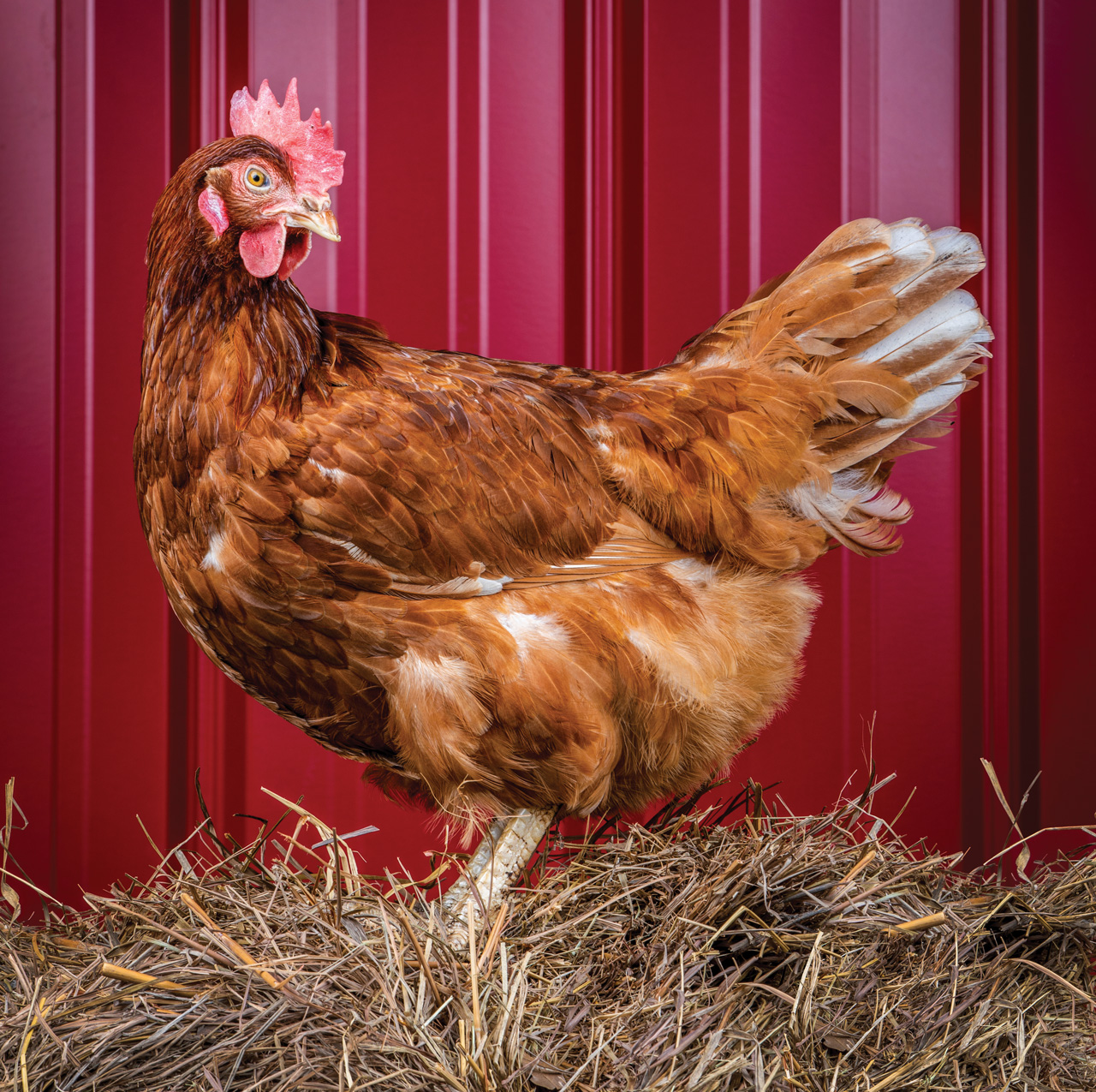
Published on Show Me Mizzou May 5, 2021
Story by Jack Wax, BS Ed ’73, HES ’76, MA ’87 | Photos by Michael Cali, BJ ’17
They’ve left their mascots behind — the pair of plush chickens that rode the breeze above their booth until the Columbia Farmers Market’s new signage rules grounded them. But even without their frequent fryers, regular shoppers know Dustin and Austin Stanton, two unassuming tall guys wearing blue jeans and work shirts. They look enough alike that they are accustomed to being called by each other’s names. A hand-lettered sign, supported by an easel, announces who they are and what they’re known for: “Stanton Brothers — Happy Hens with No Pens.”
The sign doesn’t reveal that, despite their youth, Dustin, 28, and Austin, 24, are among the market’s most experienced vendors. What’s more, their imprint on niche agriculture has earned them recognition as one of the nation’s largest independent egg producers. They’ve stopped counting the number of awards they’ve received from farm and educational groups, such as the Future Farmers of America, the Missouri Farm Bureau, the U.S. Department of Agriculture and the University of Missouri. They’ve lost track of how many presentations they’ve given to agriculture students and would-be entrepreneurs. But who could forget the time, three years ago, when Mark Zuckerberg, CEO of Facebook, touched down at Columbia Regional Airport and visited their farm to query the young men about their business, lifestyle and community involvement. “While he was here, Zuckerberg said that he was concerned that Facebook was only a tool for recreation, and he wanted it to become a tool for community building,” Dustin says. Zuckerberg is one of the richest people on the planet, but no doubt he got the identical dose of their Midwestern nice as any customer spending $3 on a dozen of their eggs. Every sale ends with the same refrain: “We appreciate your business.”
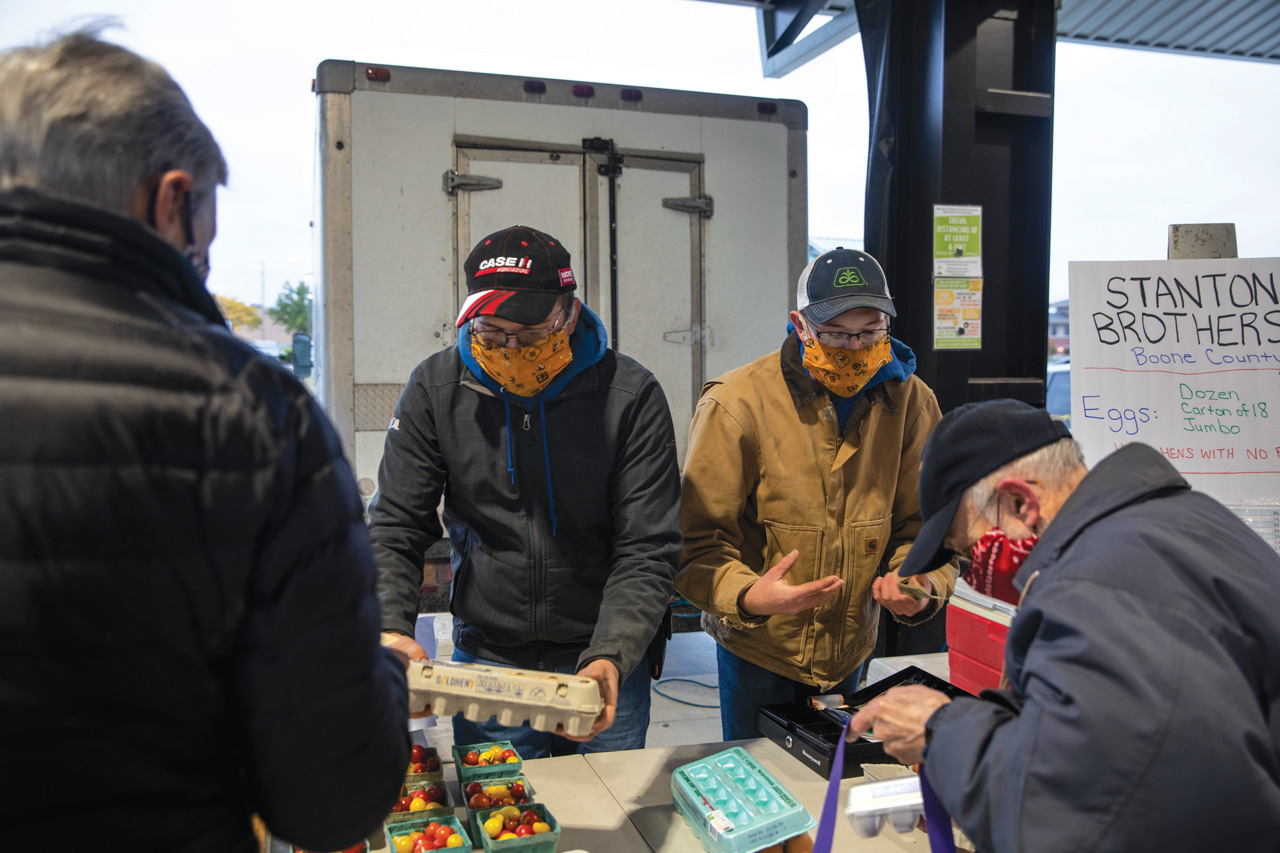
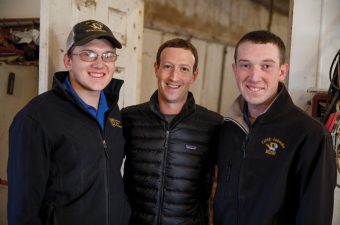
When the Stantons started thanking their market customers 14 years ago, neither of them was old enough to drive. They relied on their father, Andrew, for a Saturday morning ride in from their Centralia farm about 30 miles north of Columbia. They weren’t exactly child prodigies of chicken and egg production, but their early start gave them time to grow into the work. “I absolutely love working the counter,” Dustin says. “I know that people come to the farmers market to meet the farmers, but on the flip side, we also get to meet the customers.” Austin, who is more reserved than his older brother, gets satisfaction from seeing his work play out locally. “What’s fulfilling is being able to grow something, then, at the farmers market, you see how your work is feeding the community.”
Hardboiled, soft-boiled, scrambled or sunny-side up, their eggs have become a regular part of the diets of tens of thousands of mid-Missourians. Stanton Brothers chickens lay about 2 million eggs a year. From the farm, Dustin delivers the eggs to grocery stores, school systems, colleges (including Mizzou), nursing homes and restaurants within an hour’s drive of their farm. They market their eggs as cage-free, from chickens raised on their own non-GMO milo. “They are actually free-range by Missouri’s definition,” Austin says, “but we always stick with the cage-free label, careful to market them one step below what they actually are.”
The Stantons aren’t all eggs all the time. They also sell pork from hogs raised on their farm. A few years ago, they experimented with making honey ice cream, and they still intend to add Austin’s locally grown potatoes to their product mix. But what makes them exceptional isn’t just what they’ve produced on the farm. According to industry surveys, in the U.S., just five companies account for one-third of all egg production. The two brothers in Boone County are doing just fine competing against megacorporations.
“I think they are a true model for what our younger folk can become,” says Kent Shannon, a precision agriculture professor who had Austin in class and who remains in contact with the brothers through MU Extension programs. “They saw a niche, one in which they could provide a product locally, in a more natural way. And over the years, they’ve adapted to changes, keeping their business viable.”
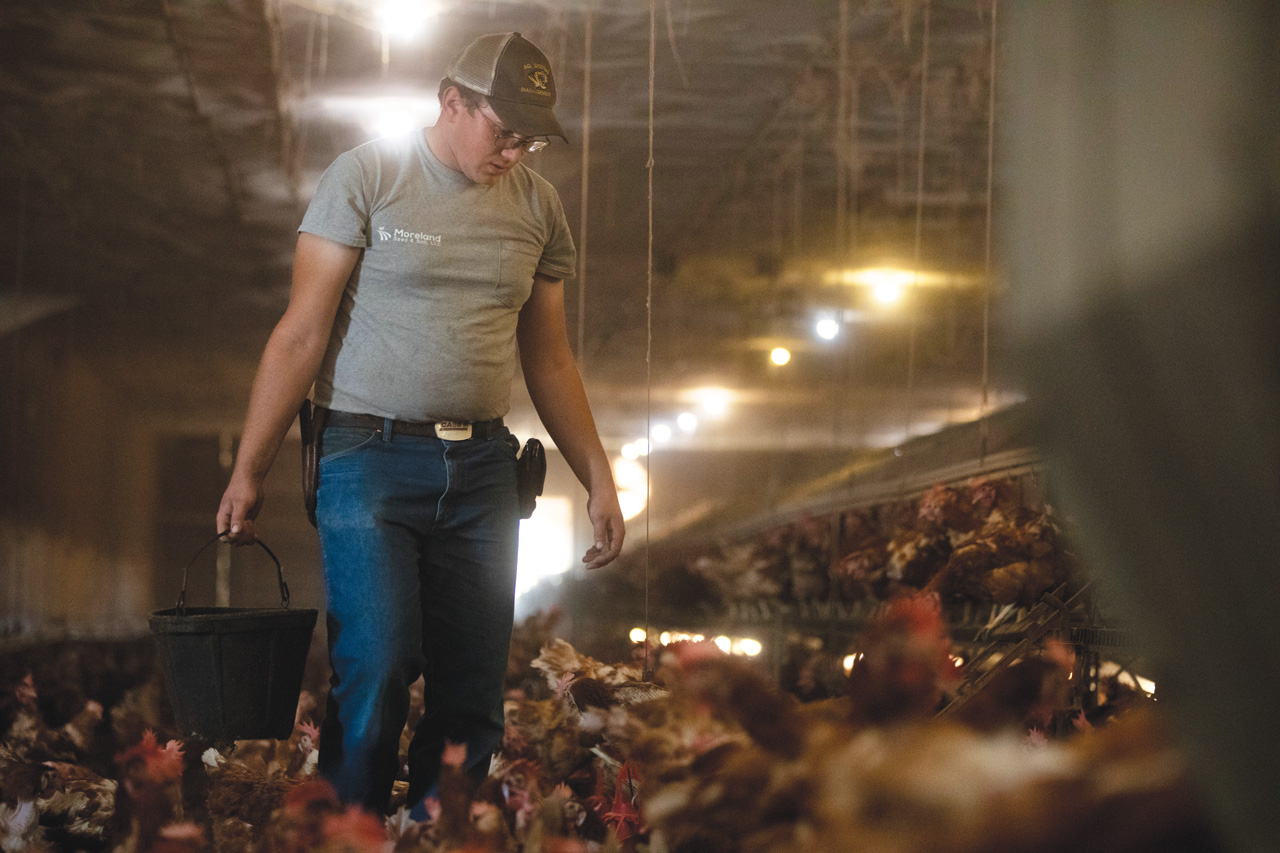
Unlike most other egg producers, the Stantons are a vertically integrated business — actually three businesses in one. They not only raise the feed and process the eggs but also handle all the marketing and sales. But more important than their business model is their business philosophy. “We are part of a community,” Dustin says. “We are involved within mid-Missouri on different levels. It’s something you don’t see from the factory farm operations.”
Their ties to MU remain strong. Jill Moreland, an adviser in the College of Agriculture, Food and Natural Resources (CAFNR), has taken several busloads of students to tour the Stanton farm and occasionally invites them to campus where they interact with students. “Not only are they doing a substantial job with their business operation, but they’re improving agriculture by educating CAFNR students and consumers,” she says.
Always eager to pitch in, Dustin became president of the Columbia Farmers Market Association in January. His No. 1 priority for the coming year is to raise the last couple of million dollars for Columbia’s Agricultural Park, which is home to the market. The additional money goes toward finishing the market’s pavilion and adding educational facilities, meeting space and a commercial kitchen for fledgling food entrepreneurs. Austin shares his brother’s vision of a thriving, healthy rural Missouri. He is treasurer for the Missouri Farm Bureau’s Boone County chapter and has served on the Boone County Extension Council.
Although many millennials may imagine making their fortunes in Silicon Valley, Dustin and Austin prefer the fields of Missouri for their dreams. Their farm is home not only to their chicken operation but also to their parents’ 100 head of cattle and 1,400 acres of soybean, milo, pasture and hay. It’s where they grew up and where they hope someday to raise families of their own.
The business is a family affair, with both their mother, Judy, and father carrying some of the workload. In return, the boys help out with their parents’ crops and cattle. Raising thousands of chickens and readying the eggs for market is gritty, nonstop work. Preparation for the Saturday farmers market starts early on Friday when Judy takes her usual position in the poultry barn that shelters the hens. She sits an arm’s length from the wall separating the aviary portion of the barn from the egg processing and office areas. Through a small opening in the wall, a conveyor belt that runs through the chickens’ nesting area presents her with a flow of freshly laid eggs. She carefully checks them for cracks or loose dirt or straw and sets them in a metal pail. Then, one by one, she places them onto an egg-washing machine that rubs, scrubs and carries them across the room, where they emerge sparkling clean. Andrew hurriedly grabs the eggs and sorts them by size, filling empty cartons. He then loads the refrigerated truck waiting just outside.
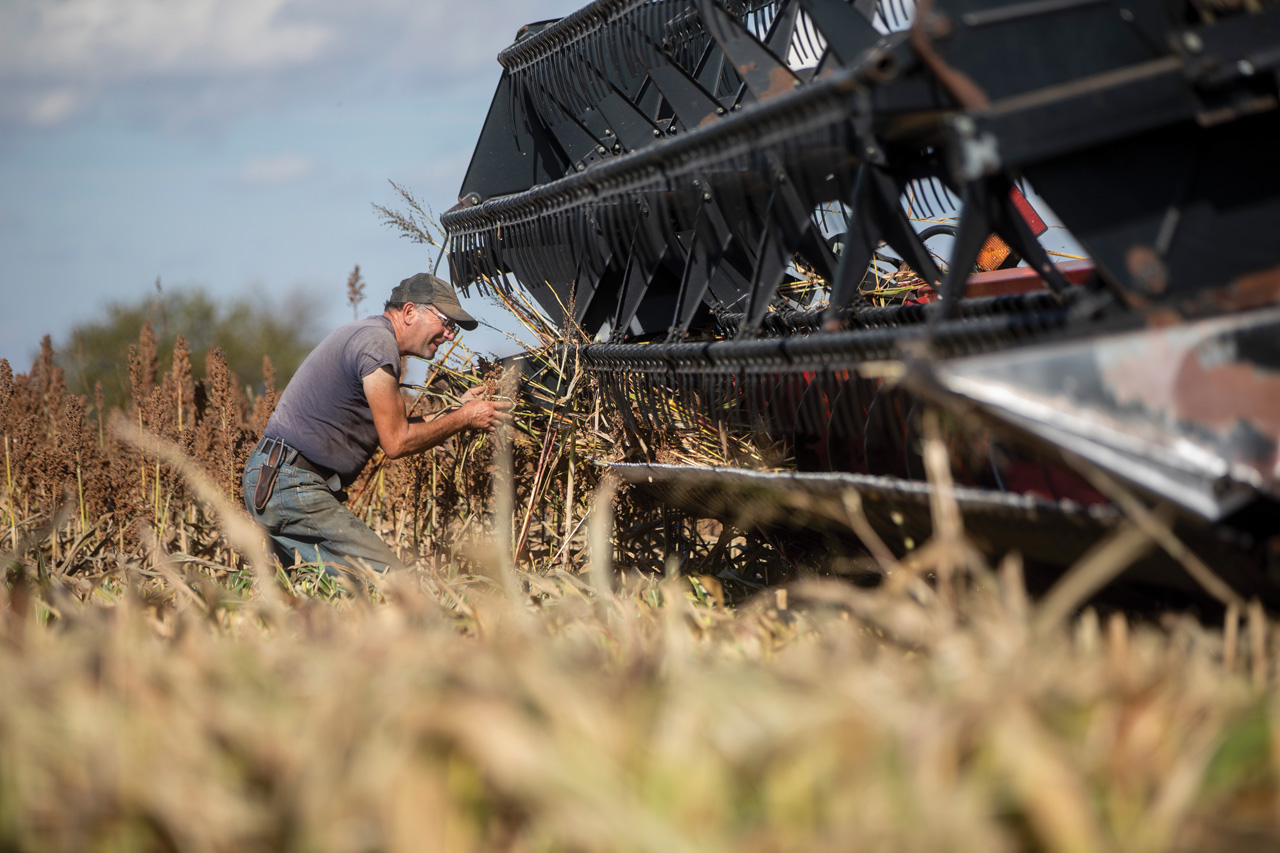
The Stantons are the Norman Rockwell image of a farm family — close-knit, working side by side during the day, eating together each evening and setting Sunday aside for church. But the physical and mental effort of sustaining that life is demanding. “It’s monotonous sometimes,” Dustin says. “If you don’t feed the chickens and gather the eggs today, you have to do twice as much the next day.” He’s a bit tired this Friday, having worked late last night, planting his parents’ wheat by the light of the moon. He would have preferred to use his tractor’s headlights, but they weren’t working. The forecast called for rain for the next day, so he had to get it done.
Living and working together has its advantages and disadvantages. “Sometimes you don’t have to say anything but you know what the other one is thinking,” Dustin says. The brothers have an easygoing rapport and a working arrangement that complements each one’s strengths. Austin loves the hands-on aspect of farming. He’s happiest fixing tractors and working the field. “I share a weakness with my father for new equipment,” he says. Dustin enjoys the marketing and makes most of the sales calls. “But we meet in the middle sometimes,” he says. As the older brother of a less talkative sibling, Dustin deftly brings Austin into the conversation. “Austin wouldn’t tell you this,” he says, “but … .”
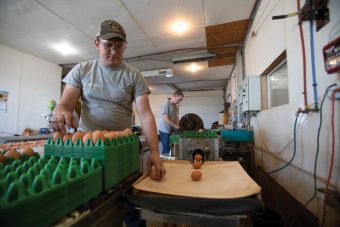
The brothers rise at 5:30 a.m., before the sun and their hens. (No roosters are allowed on the farm.) Although the pandemic has slowed business, they still have a full day of Zoom meetings to attend, deliveries to make, chickens to check on and machinery to maintain. “If you’re just an employee somewhere, you clock in and clock out. But for us, we clock in and never clock out,” Dustin says. The payoff: He loves the independence and “knowing your success is due to something you or your family did.” Austin likes the security and stability that their business brings them. “Here, on the farm, I can mess up big time, but as long as I’m not losing money, we can keep going,” he says.
Entrepreneurial spunk and can-do spirit flow through Dustin and Austin’s veins and history. The Stanton farm has been in the family since 1845 and even survived a Civil War battle that took place on its southern end. Like all farmers, they’ve had to overcome their share of setbacks. Changes in Food and Drug Administration and USDA regulations and interpretations have forced the brothers to make significant changes over the years. Originally, all the chickens stayed outside all the time. At their peak five years ago, the Stantons had almost 25,000 chickens coming and going as they pleased, laying eggs in their barns, pastures and anywhere on the farm they felt like nesting. Profits rolled in, and they built an 8,000-square-foot poultry barn — just in time. New rules required them to reduce the flock and move them inside, where they now stay most of the time. “I could comply with the regulations, or I could risk committing a felony,” Austin quips. “Easy choice.”
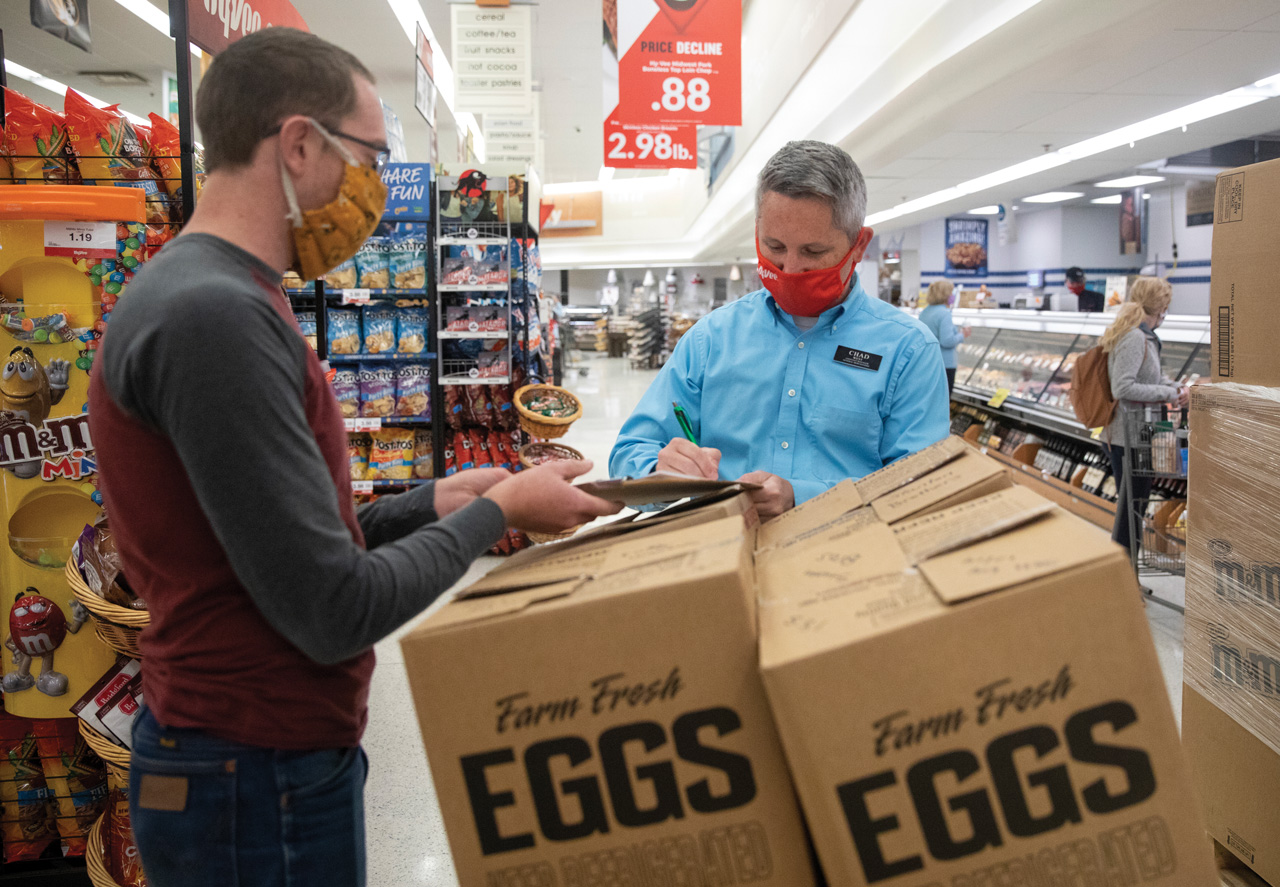
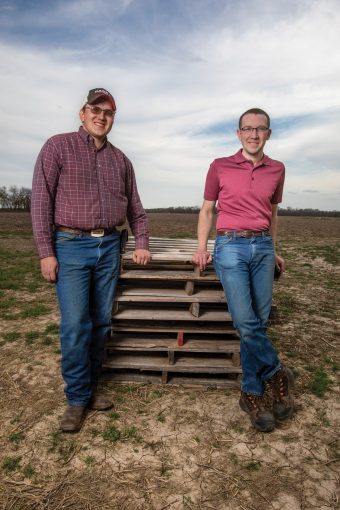
Going to MU and completing degrees in the College of Agriculture, Food and Natural Resources were also a natural. Dustin had a full-ride scholarship, and Austin earned scholarships after beginning his studies. Despite starting courses with more than a decade of farming and business experience under their belts, both say their time in the classroom was well spent. “Anyone can learn to run a combine or tractor,” says Dustin, “but successful farmers have to learn how to run a balance sheet and a profit or loss statement.” Stanton Brothers Eggs wouldn’t be a growing business and an inspiration for aspiring young food producers without their commitment to learning — hands-on, in the classroom, and through networking with experts and other farm leaders.
“There’s this misconception that once you go to school you have to know all the answers to every problem,” Dustin says. “I think that what you have to do is learn how to find the answers to everything.”
Or maybe not quite everything — even the Stanton brothers have yet to figure out why the chicken crossed the road.
To read more articles like this, become a Mizzou Alumni Association member and receive MIZZOU magazine in your mailbox. Click here to join.



